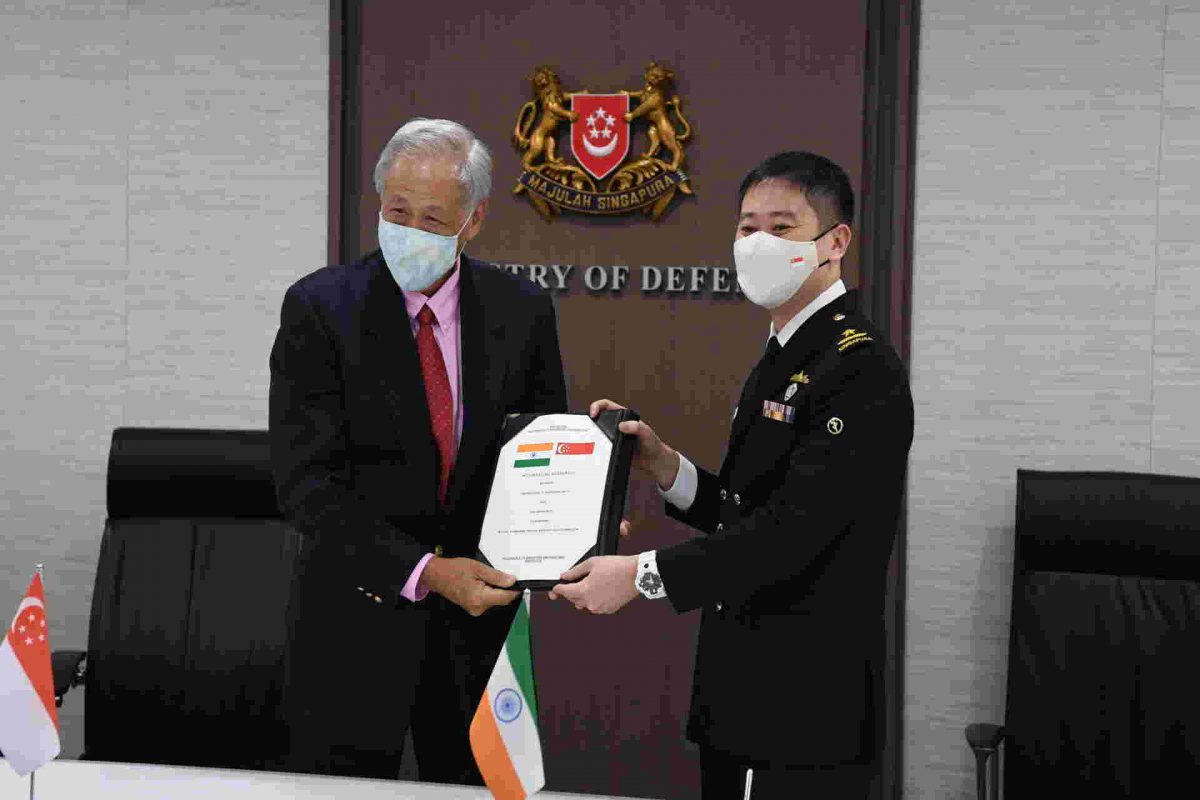Even as 'vaccine diplomacy' continues to strengthen India's ties with its neighbours and key partner countries, the Narendra Modi government continues to make significant progress in expanding existing partnerships in the Indo-Pacific region to shape a new regional order. The signing of the Implementing Agreement on Submarine Rescue Support and Cooperation between the two Navies during the fifth India–Singapore Defence Ministers' Dialogue (DMD) held virtually between Rajnath Singh and his Singaporean counterpart Dr Ng Eng Hen today will result in a substantial increase in bilateral cooperation and defence partnership built over the years.
India has maintained that it does not see the Indo-Pacific region "as a strategy or as a club of limited members or as a grouping that seeks to dominate" and that "it is not directed against any country but stands for "a free, open and inclusive region." However, the fast-changing power dynamics in the region, including the revival of Quad, has seen many countries cement their ties with India, a country which has always had an "independent" foreign policy.
India and France, during their annual Strategic Dialogue held earlier this month, had also extensively discussed cooperation in the Indo-Pacific region.
With India batting for a stable and prosperous Indo-Pacific, the defence and security engagements between India and Singapore have broadened significantly in scale and scope across all three Services of the Armed Forces as well as in the areas of defence technology and industry. Both countries have also found common ground on multilateral fora and engagements.
The Joint Statement released by both the countries after the DMD reaffirmed both countries' commitment to strengthen defence cooperation. Both Ministers recognised the positive trajectory of bilateral defence relations that has expanded into new areas of cooperation, such as in Humanitarian Assistance and Disaster Relief (HADR) and cybersecurity.
The Indian Navy and Republic of Singapore Navy (RSN) successfully conducted the 27th edition of Singapore-India Maritime Bilateral Exercise (SIMBEX) and also participated in the second edition of the Singapore-India-Thailand Maritime Exercise (SITMEX) in November 2020. These exercises not only enhanced interoperability amongst the navies but also underscored the shared responsibility of the countries to work together to keep sea lines of communications open.
Incepted in 1994, SIMBEX is one of the RSN's longest-running bilateral exercises and has over the years grown in scope and complexity, expanding beyond conventional naval warfare to include elements of maritime security. During the SIMBEX 'at-sea only' exercise in the Andaman Sea and Indian Ocean last year, the two navies executed gunnery firings, manoeuvring drills, communication exercises and advanced naval warfare serials, including anti-submarine and anti-surface warfare drills.
While Singapore had sent two formidable-class frigates, RSS Intrepid and RSS Steadfast (embarked with an S-70B naval helicopter) and the Endurance-class landing ship tank RSS Endeavour for the exercise, the Indian Navy had participated with the Rajput-class destroyer INS Rana (embarked with a Chetak helicopter), Kamorta-class corvette INS Kamorta, Kora-class corvette INS Karmuk, Sindhughosh-class submarine INS Sindhuraj, and a P8I maritime patrol aircraft.
Singh reaffirmed today ASEAN centrality in the regional security architecture and pledged India’s support to all endeavours of the ASEAN Defence Ministers' Meeting (ADMM)-Plus, Dr Ng expressed support for India's upcoming co-chairmanship of the ADMM-Plus Experts' Working Group on Humanitarian Assistance and Disaster Relief (HADR).
"There are many new areas, including defence technology, that both sides can build shared interests and shared capabilities… Overall, our defence ties and military engagement with India have grown significantly, and we welcome this partnership. I am very happy that Minister Singh and I share a common purpose to push defence ties even stronger," the Singapore Defence Minister said after the meeting.
Both ministers also conveyed their full support towards the early conclusion of agreements to facilitate conduct of live firings and to establish reciprocal arrangements for the cross-attendance of military courses.
Meanwhile, Defence Minister Ng Eng Hen has also announced that the annual Shangri-La Dialogue, one of Asia's premier defence summits organised by the International Institute for Strategic Studies (IISS), will be held this year after being cancelled in 2020 due to the Covid-19 pandemic.
The unique meeting where ministers debate the region's most pressing security challenges, engage in important bilateral talks and come up with fresh solutions together has seen an active participation from India since it was launched in 2002.




















